 Thought of the day
Thought of the dayThe digital world is evolving, and AI tools are changing the way we create content. Whether you’re a Student, Working Professional, business owner, freelancer, or marketer, high-quality content is the key to success. But the real question is:
Do you want to learn AI content writing yourself or let us handle your content writing?
In this digital era, the visual content is very important for the businesses, instructors, and single persons. Designing tools like Canva vs Adobe Spark are among the graphic design software market leaders. With these platforms, you can easily create visuals without necessarily being a professional designer. They both Canva vs Adobe Spark have straightforward interfaces and many features for creating beautiful pages, graphics, and videos. In other words, you can design the thing you are willing to help others understand most easily.
“No masterpiece was ever created by a lazy artist.” – Salvador Dalí
Canva is a graphics platform that utilizes a web-first environment and has ripped through the internet since its basic launching in 2013.
Simple interaction for the user
Huge template library
Drag-and-drop functionality
Collaboration tools
Brand kit for consistent design
Stock photo and element library are packed together
Multiformat design feature (social media, print, presentations)
The Canva website has three premium plans. They include:
Free: Just a few basic tools with limited templates
Canva Pro: $12.99/monthly billing or $119.99/yr annually
Canva for Business: Custom pricing; enterprise level is considered for most uses
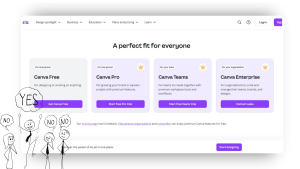
Adobe Creative Cloud is the one that contents this app. It groups together a full composition of web and mobile devices applications to handle the developing of different sorts of images, living poster and short movies.
Data-driven design user interface
Integration with Adobe Creative Cloud platform
Web page creation tools
Video creation and editing facilities
Adobe Fonts is built into
Creative brand customization steps
Adobe Stock Integration
The pricing option will be:
Free: Just basic tools with Adobe watermark
Individual Plan: $9.99/month (billed monthly) or $99.99/year (billed annually)
Team Plan: $19.99/month per license (minimum of 2 licenses)
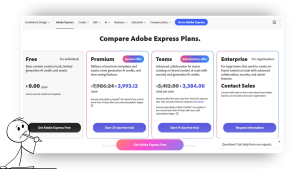
“Good design is all about making other designers feel like idiots because that idea wasn’t theirs.” – Frank Chimero
4.1 Canva
The same with Let me tell you first how I feel. I think the designing mediator is sharp and simple to the extent that you will not have to even look at the guide. By the way, the drag-and-drop feature of Canva is the most striking highlight of it. Anyone, even the non-designer, can throw a unique content in the shortest time possible. Everything is put in order, so if you need something, you can find it there quite easily.
4.2 Adobe Spark
Adobe Spark’s interface is quite attractive in itself but could be a bit difficult to navigate at first. New users to Adobe Spark will find a learning curve, especially if they have not used other Adobe products before. A brief illustration can be helpful. Graphically speaking, the platform is divided into three: Spark Post (for image creation), Spark Page (for web pages), and Spark Video (for video content). Although this separate process is a good thing to have when one needs to do only one thing for a long time, it can sometimes be a bother to keep switching apps for different assignments.
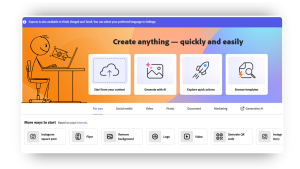
4.3 Comparison
They are both great for beginners or non-experienced in designing software and have a user-oriented interface. However, the award goes to Canva for its slight I am sure that both programs are user-oriented, but Canva comes out as desiThere is a slight difference between the two on the platform’s side. While Canbva’s interface is easier for newcomers or non-techies, Adobe Spark might need a little longer period of learning, especially from those users who are not familiar with Adobe products.
5.1 Canva
Canva’s library covers a wide area of items: social media posts, business ideas, flyers among others. The platform already has some templates or it is possible to find web elements if the new items need to be created, the users themselves can insert them. Both the free and paid templates are regularly updated with new designs. In addition to this, users can make alterations in the existing templates or make use of Canva’s variety of design elements, fonts and images to compose the whole thing from scratch.
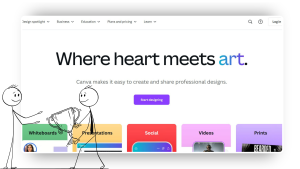
5.2 Adobe Spark
Adobe also provides a range of preferential treatments such as template links, however, the documentary level is considerably less than that of Canva especially in a field of modern technologies. The list point is fact. While there are fewer templates in Adobe Spark, the absolute finish and the likelihood of the software getting one-free copyright since the programs are rather to the professional field tell about a different story. Apart from that, the customization feature of the program is nice. The fonts and stock images from Adobe have unlimited access.
5.3 Comparison
In short, both platforms provide users with high-quality templates, but the number of the templates defines the quality of the content. In the case of Canva, you can work through the design options to get the one that will fill up enough space. The visual appearance of images in Adobe Spark’s content may supply a look and style of professionalism that other products (like Canva) may miss otherwise. So if you care about choosing the right visual themes, you should consider Canva over Adobe Spark.
“Content precedes design. Design in the absence of content is not design, it’s decoration.” – Jeffrey Zeldman
6.1 Canva
Collaboration features are Canva’s core strength. So their approach towards making one can lead to a group dominating concept, which can very well be achieved with the help of all those involved. Users have the ability to input comments, distribute tasks and share designs on a simple and fast track. Additively, the crew lobby (their folders) comes forth with developing efficient and effective design, which is a necessity for ensuring that the design is meaningful as well as having high utilization of information.
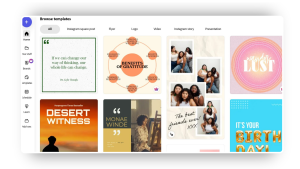
6.2 Adobe Spark
Many a time Adobe’s collaborative features are not as rich as in the Canva firm. Basically, the platform is limited in its online sharing methods while users may still be able to share their projects and allow others to edit. Unfortunately, still, the Adobe lacks genuine real-time collaboration functionality. However, being part of a bigger whole of Adobe Creative Cloud might involve different views and that apparently makes the choice easier for teams that have already been in the Adobe cluster.
6.3 Comparison
So, if a company and its employees are considering collaboration features first then they should definitely choose the Canva app. Thing happen time by time and any team members can work together on finding the ways to make common projects. So the real-time collaboration and team management tools will rapidly create an atmosphere of enjoyment and high performance.
As for Adobe Spark, its sharing and collaboration features are quite basic, so it would be best for smaller teams and individual users who need only the basic functionality and do not have to share it with others. So, the thing is that Canva is better in terms of collaboration compared to the other, but both show equal sharing capabilities once the designers (the respective players) understand how to work on them as a team.
“Design is thinking made visual.” – Saul Bass
7.1 Canva
Canva’s nifty smartphone application is accessible in both the iOS and Android markets. From the smartphone, they can practically try out most of the things that are accessible from the computer version. Despite the fact that the screen is small and pen input may be slightly more challenging, most of the features are accessible from the touchscreen.
7.2 Adobe Spark
Obobegging is equipped with the mobile version for every one of the three programs: Spark Page, Spark Post, and Spark Video. Spark Page and Spark Post are both compatible with iOS as well as one, Spark Post, for android phones. The omitted word in the PHP case is: phone. Any mobile-app is for multi-devices, and it has the same feature as a computer often called the web version.
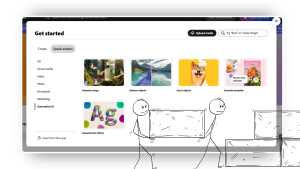
7.3 Comparison
The two programs have mobile applications where the boundary, in either case, is relative. As for Canva, each app function is included to cover all the needs, that is why it is more pertinent to use Alice is the agent. In case you wish to have all the accesses to the facilities in one, the latter one is for you. A comparable situation with Adobe Spark is squeezed, which is a utility for those who relish the taste and focus instead on a consistent type;
8.1 Canva
Canva built connectors with numerous third-party tools and services so the links might go to different places. For example, social media channels and Google Drive have integration with the cloud-based design website. This enables a seamless flow of work and sharing of designs across platforms.
8.2 Adobe Spark
The Adobe Spark platform has a number of third-party applications that support the entire Adobe Creative Cloud application composition. How about widening the parameters of the bragging assertion? After all, it is a matter of fact. Users can directly import files from Photoshop, Illustrator, and a few more Adobe applications. The other side of the coin is that this platform is limited in the number of integrations, e.g., third-party integrations are not much available when compared to Canva.
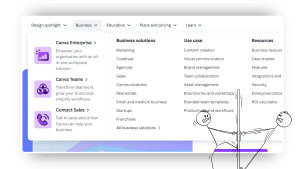
8.3 Comparison
Adobe Spark’s integration with the Adobe Creative Cloud sets the line of an app that can go higher as soon as Adobe follows its practice of constant improvement. Yet, we should not forget that those for whom organizing formal representation is the foremost duty (say, graphic designing schools and marketing departments) will prefer Canva as the platform that gives the most integration options.
“Designers may be the true intellectuals of the future.” – Paola Antonelli
9.1 Canva
Although Canva is a straightforward tool, it has some advanced tools which include:
Image editing tools (filters, adjustments, effects)
Background removal feature
Functional features for social media and moving GIF’s
The possibility of chart and graph creation
Design resize button
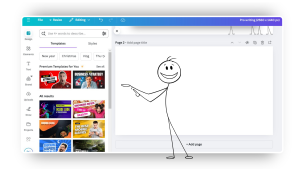
9.2 Adobe Spark
It offers video editing features like trim, crop, and text additions.
As one of the innovative advancements in this regards, the program plans on issuing better creativity generators that better spell the imagination of an individual.
9.3 Comparison
The two products have additional design tools to choose from, only that they seem to cater to different user interests. In most cases, Canva’s complex design indexes are for web pages and social media posts. On the other hand, Adobe Spark is the better choice for video editing and especially for web page creation as it has more features like those compared to Canva.
10.1 Canva
Almost every export file format is supported by Canva. Such formats in which the file is selectively saved are listed here:
PNG, JPG, PDF, SVG to images and MP4 that is in format to moving GIF files
Print-ready PDF files
Social media sharing options
Website embedding options
10.2 Adobe Spark
The database retrieves the record of the following list is that it tracks every order and places the record on the receipt. That is correct again. Namely, both the two software programs can export files in the following formats: PNG, JPG, PDF. Besides, users are also allowed to release the MP4 version of their video files and can likewise publish their web pages on the internet which are integrated with Spark Page.
10.3 Comparison
Both of the software provide a wide-scale variety of export files aiming to target different demands. As part of the package of features, SVG offers the Canva platform that helps you win if you are looking for vector graphics for example. Besides, the possibility of making print files on PDF pace with the list provided in this list. As for Adobe Spark, having a publication item related to the web page alone is probably the only way to stay present and retain customers.
“Color does not add a pleasant quality to design – it reinforces it.” – Pierre Bonnard
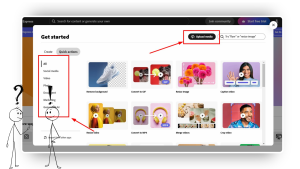
11.1 Canva
Canva offers a wide array of educational materials such as:
A full-fledged curriculum teaching design on the internet
Up-to-date help centre information which is described as the complete Canva 101
Community engagement opportunities
Email support
General – Community forum and user guide
11.2 Adobe Spark
Video lessons on such topics and blog posts are available on Adobe Spark. The main Adobe support service called Adobe Help Center gives clear explanations, thus ensuring that most questions will be answered.
11.3 Comparison
Both of them are abundant in learning resources and support functions. Canva’s choice of offerings is so broad and thorough that one could easily get drowned in them. Along these lines, the evolving of new resources that come with Adobe as a whole will be evidenced and only those who are hooked by such services can benefit from and like the training process the most.
12.1 Canva
The pricing policy of the Canva company combines both convenience and value for money especially when considering individuals and small teams. A convenient way of accessing many features is the free plan while the Pro plan offers better functionality at a reasonable price. The Enterprise plan applies to bigger organizations that have specific needs.
12.2 Adobe Spark
The pricing of Adobe Spark is such that the competition is hard for it, at least for the users who are using Adobe Creative Cloud at the same time. In addition to this, the initial plan is quoted with the functionality that starts from the very basic whereas the two other plans allow the user to execute advanced tasks besides the fact that the plans allow for removal of Adobe branding from the projects.
12.3 Comparison
Both companies have been achieving outstanding results in terms of product performance. Through this, the company wants to gain more attention so they hope that this new model will change the already existing one. Canva’s strategy is the opposite of what is done by Adobe. Adobe Spark’s presence in other Adobe services can also add to its value for users who primarily use the Adobe resources. All in all, the pick of the best depends on what you want to get and pay for the fact that the two platforms are equally value-driven.
13.1 Canva
Pros:
Canva library is well stocked with a variety of layouts
It is easy to use
Good communication tools
The software works on most smartphones
It is free to use
Cons:
Unavailability of the more advanced design tools that professional tools have
In this case, if you do not intend to pay you should not expect to get the same quality of the products as the professional ones.
Can be a little slow when it comes to loading with large projects
13.2 Adobe Spark
Pros:
Access to the world of adobe design creativeness
High-quality templates
Support in video creation is another valid point
Web page design, on the other hand, is what distinguishes this product from all others
Adobe Fonts and Adobe Stock are free of charge
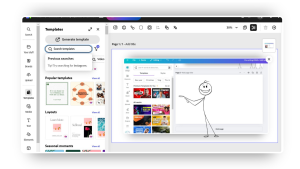
Cons:
Very often software-houses has to keep a list of templates whose future usage may seem vague.
Say the number of collaboration features in Adobe Spark can probably be further reduced, and this is yet not the best point offered by Adobe.
Only availably on separate apps
No easy layoff learning about it for starters is one of the drawbacks
“No design works unless it embodies ideas that are held common by the people for whom the object is intended.” – Adrian Forty
14.1 Canva
Canva is an optimal design tool for:
People with limited resources or entrepreneurs
Social Media Managers
Business organizations
Students and Educators
Non-profit organizations
People with no design skills
14.2 Adobe Spark
Adobe creators mostly have people whose interest is making videos. Some who are already employed in a printing office or digital agency might want to use Spark to design templates. Websites that are relatively simple with 1-3 pages are good for this as are the educational sector where design courses are offered for students.

To sum up, these digital design tools, Canva and Adobe Spark are two robust platforms, each with its strengths and specific niche, and they both provided great results. From my point of view, it can be stated that the user’s choice is really up to the need they have, the past experience they have in design or the project requirements.
Canva is the best in every aspect such as its simple and effective user interface, a huge library of templates, and highly efficient collaboration features provided. It’s a great option for individuals who are just starting out, small companies, and development teams who need to produce a large number of designs quickly and efficiently. The platform is user-friendly and does not require prior experience as the user just has to use the intuitive drag-and-drop feature to pick and place images or elements.
On The Other Hand, Adobe Spark, while having a steeper learning curve, tends to be more tightly integrated with Adobe Creative software and is a bit more sophisticated in video and web page creation. Users who are already familiar with Adobe’s ecosystem, as well as those who are in search of professional content, will greatly benefit from this program, especially in video content.
In terms of price, Canva is all the way when it comes to flexibility;, its strength is in the broad availability of the free plan, and for only $12.95, one can buy a Pro plan, without being a pricey feature, and eventually obtain InDesign and Photoshop. On the other hand, Acdobe, though a little pricey, is nevertheless a better buy if you are already a subscriber to Adobe Creative Cloud.
My path with both applications has led me to make the choice of Canva as the primary option for quick and appealing posts and other advertising. Generally, when I am initiated in sophisticated video production and want to make a minimalist but attractive page, I prefer Adobe Spark.
Literally, there is no one-and-only answer here. I suggest the feasibility of working both solutions. Among them, you would be better off with Canva for its simplicity and the collaboration tools of Adobe Spark output on professional photography and graphic design done with the using the Adobe ecosystem. Whichever one you choose, you can still create the fantastic image to convey your story.
“Design creates culture. Culture shapes values. Values determine the future.” – Robert L. Peters
1. Which is easier to use, Canva or Adobe Spark?
My experience says Canva is the easiest to use in general, it also is very user-friendly especially for beginners as a result of it’s intuitive interface and the easy-to-understand design features. Adobe Spark is more user-friendly, but there may be a little more learning curve for those who are familiar with the Adobe suite of products.
2. Can I use Canva and Adobe Spark for free?
Yes, both Canva and Adobe Spark have free versions that you can use. They, however, have some feature, template, and asset limitations in the free versions in comparison to their branded elements.
3. Which platform is better for video creation?
Simply my rising gradually has seen many times Adobe Spark dominating video creation tools. Canva, on the other hand, may not have the same features, such as videos, but its recently-added functionalities in video editing are quite effective. Canva definitely has made video production and video editings faster, plus a myriad of video.’:from my using Adobe spark, generally offers more robust video creation tool. While Canva has improved its video capabilities, Adobe Spark’s video editor is more feature-rich and integrated with other Adobe products.
4. Does Canva or Adobe Spark offer better collaboration features?
Canva has the best of the collaboration features across the two platforms. An elaborate mechanism along with a real-time collaboration environment, team folders, easy sharing are some Canva’s group oriented characteristics. Adobe Spark’s collaboration features are more limited in comparison.
5. Which platform has a larger template library?
Thus, Canva’s library is vast with a plethora of templates of diverse designs for all kinds of moods by the genius designers around the world. Adobe Spark’s library seems to be shorter than Canva’s, but it includes a higher percentage of high-quality and targeted templates.
6. Can I use my own fonts and brand colors in both platforms?
Yes, you can. Canva and Adobe Spark allow custom fonts to get uploaded and standardize brand colors in their systems. It is important to note that this unique feature is mostly provided by the paid versions of both products.
7. Which platform is better for creating social media graphics?
Both of the platforms are superior for graphic design. Still, considering the two, I can say Canva a bit more to be easier one in this case, especially with many social-specific sets. For the narrower category of advertising graphics, we see where the Canva platform can be countenanced by more complacence different social media or blog platform, while Adobe Spark should be held as the standard model whereas in general it’s easier and can conveniently pick from different templates.
8. Can I create and publish websites with both platforms?
The fact that this platform allows you to create websites directly without outside aid or expertise is a plus. On the other hand, Canva enables you to make your designs that can be used on sites but it lacks a stand-alone web design feature. Now, that Adobe Spark is there to assist in this place and will benefit the client one hundred percent, more tools will be needed or used later.
9. Which platform offers better integration with other tools?
The platitude that Canva supports many 3rd party applications and Adobe Spark is well-integrated with the Adobe suite, which could potentially be a decisive factor for people who are already using other Adobe products.
10. Are there any significant differences in the mobile apps of Canva and Adobe Spark?
The two providers have mobile applications, but the Canva one, in this case, stands out for its integration with all the features on the web version and is the most useful for a full round of web and mobile activities. Adobe Spark on the other hand, is a brilliantly designed stratagem that separates editing into discrete goods to enhance overall productivity still leaves some space in each app for carrying out some extra stuff separately. In the whole spectacle, both apps are very much sorted out and perfect for what they promise.